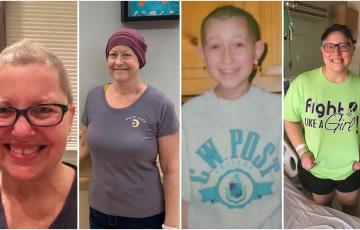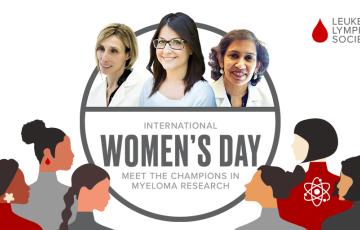Search Results
Lenalidomide
Lenalidomide is FDA approved to treat patients with:

Researchers Share Key Career Advice with LLS College Club Members
I recently had the privilege of moderating an LLS on Campus Researcher Panel attended by LLS college club members from nearly 30 universities across the country. These clubs bring together students interested in pursuing health-related careers and provide opportunities to hear from scientists working to better understand and treat blood cancers.

Helping Blood Cancer Patients and Families When It's Needed Most
In honor of Blood Cancer Awareness Month, Dr. Gwen Nichols reflects on our vital work to support blood cancer patients and their families.

3 Things You Might Like to Know About Being Newly Diagnosed
A cancer diagnosis is a pivotal moment in a person’s lifetime.
From that point forward, it’s a part of who you are. It shapes how you think about the world—through the lens of your diagnosis and what’s important to you.
Ivosidenib
Ivosidenib is FDA approved for the treatment of patients with a susceptible IDH1 mutation as detected by an FDA-approved test in:
Rituximab and hyaluronidase human
Rituximab and hyaluronidase human is a combination of rituximab, a CD20-directed cytolytic antibody, and hyaluronidase human, an endoglycosidase, indicated for the treatment of adult patients with:
Announcing a New Light The Night T-shirt Contest Winner, Drumroll Please…
The Leukemia & Lymphoma Society (LLS) has officially tallied up the votes for the 2016 Light The Night t-shirt contest submissions, and the winning design comes from 37-year-old Joshua Redmond of Centerville, Ohio.
A graduate of Ohio University’s School of Fine Art, Redmond earned his degree in graphic design and printmaking and has been working professionally in the industry for over a decade.

Meet the Researcher: Maria Figueroa, MD
Our “Meet the Researcher” series on The LLS Blog shares what our outstanding LLS-funded researchers are working on, the incredible impact they’re making in the fight against blood cancer, and what inspires their efforts to find better treatments and cures. Dr. Maria “Ken” Figueroa, Associate Professor and Co-Leader of the Cancer Epigenetics Research Program at Sylvester Comprehensive Cancer Center, part of the University of Miami Health System, is focused on an exciting area of research called epigenetics.

The Gift of Time: Giving More Moments to Blood Cancer Patients
As we transition from one year to the next, we often reflect on milestones achieved, challenges faced, and moments shared with those we love. It’s a time to focus on what’s most important—family, community, and how we’ll spend our time going forward. At the Leukemia & Lymphoma Society (LLS), we know that time is more than just a passing moment for blood cancer patients. It’s the most valuable gift they can receive.

Exercise for blood cancer patients
Table of contents:
